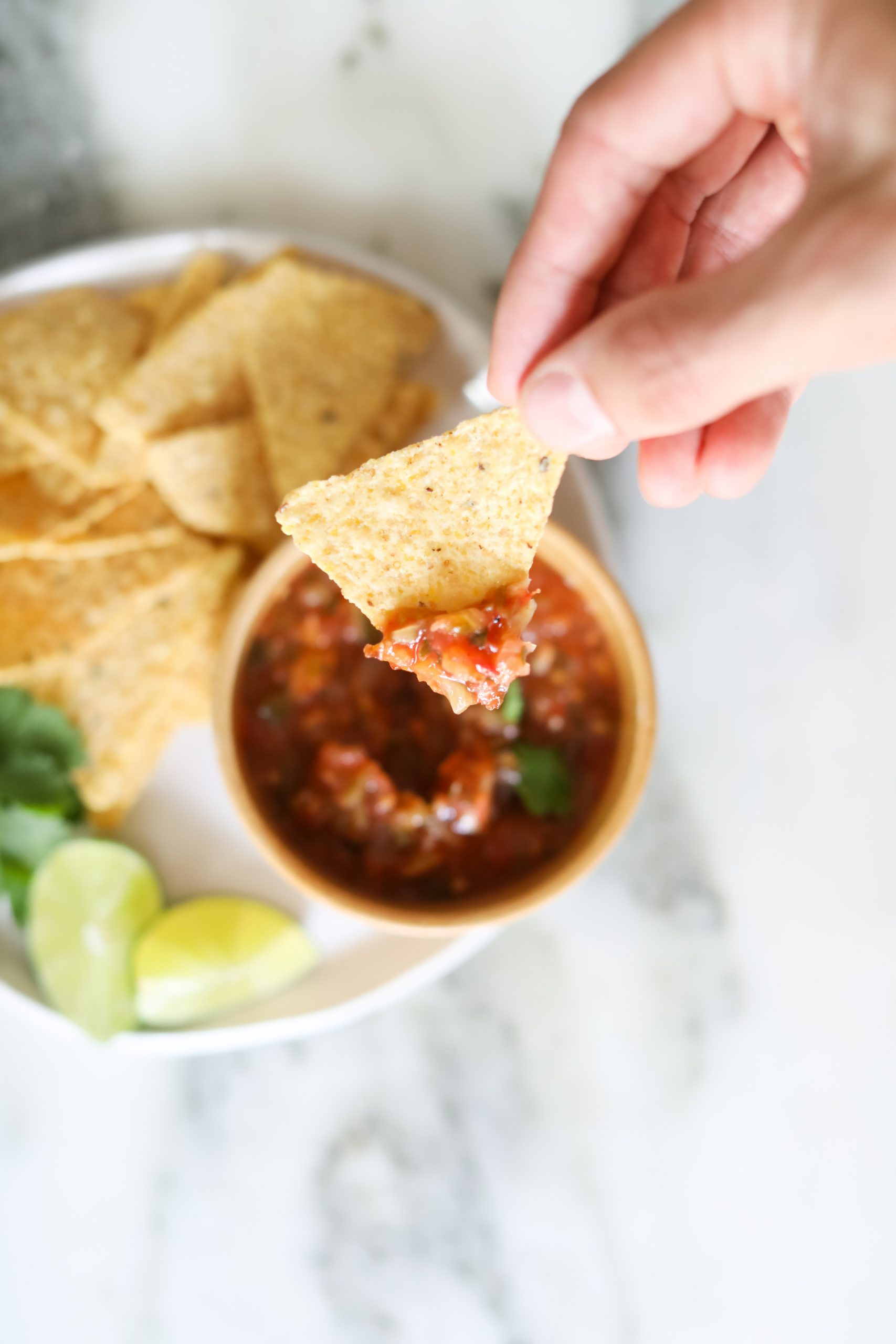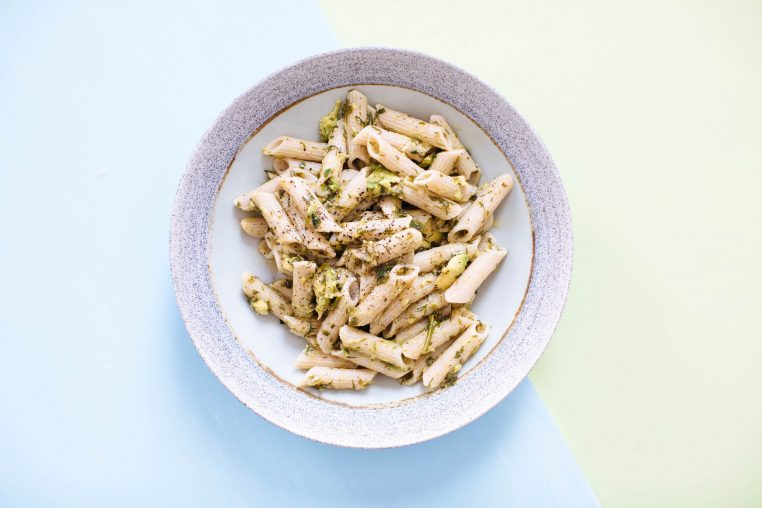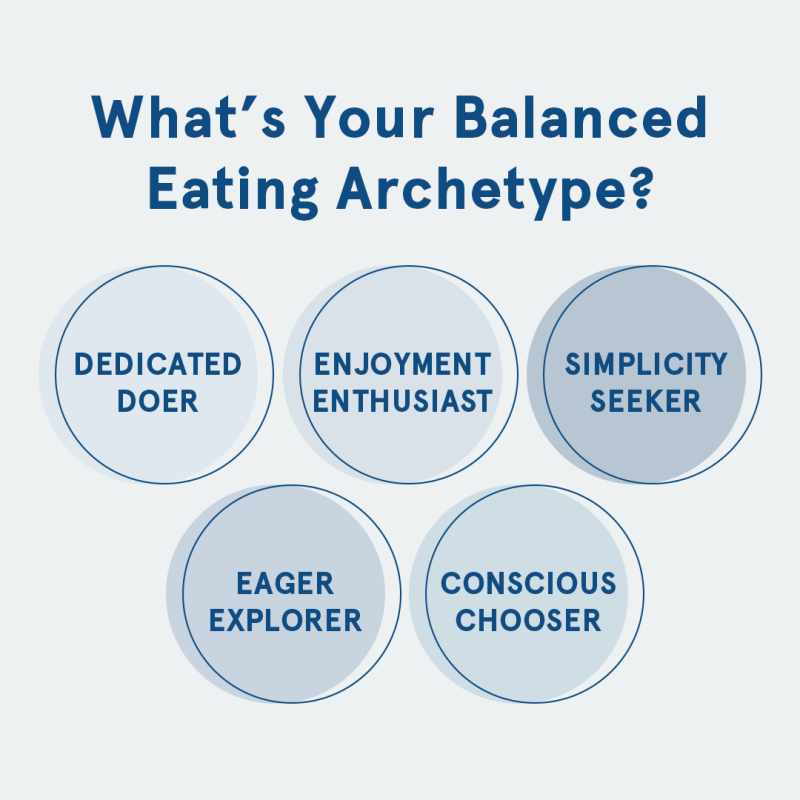How to identify unsupportive eating habits and know when to choose a more balanced, supportive path.
Think about this for a minute…
Have you ever tried a way of eating that someone recommended, whether that was a specific diet or even a guideline? After trying it, did you ever stop to check in with yourself and ask, “Is this working for me and my unique needs?“?
It can be so challenging to navigate all of the nutrition advice that’s out there and feel confident in knowing that the way you’re nourishing yourself is truly supporting you.
Each of us is so different, and eating habits that may work really well for one person may be unsupportive for another person.
That’s why one of our main focus areas here at Nutrition Stripped is guiding you to understand your unique body and lifestyle so that you feel confident in what works best for you.
Here you’re going to discover a few signs of unsupportive eating habits to look out for. That way, you’ll know whether or not a particular eating habit or way of eating is working for your unique needs.
8 Signs You Have Unsupportive Eating Habits
Whenever you try a new eating habit, set a time to check in with yourself. That way you can see if it’s working for you and notice if any of these signs have appeared.
If you’re experiencing any of these signs, that’s a strong indication that it’s time to adjust your eating habits and try something new. We’re always here to support you with that!
1. You don’t feel your best physically
Let’s start with one of the most obvious signs that you’re eating habits are unsupportive. You may feel low on energy or as though your digestion is off. You might have mood swings or even struggle to concentrate.
Food plays such a large role in how we feel on a daily basis. Bringing awareness to your physical body to check in can give you insight into what is and isn’t working for you.
If you notice that you are regularly feeling less than your best, that’s likely a sign that your eating habits need to adjust for them to work better for your unique body.
2. You’re constantly stressing or thinking about food when your eating habits are unsupportive
We hear from so many of you in the Nutrition Stripped community that you’re feeling stressed about food or you feel you’re constantly thinking about food all day.
It’s normal to feel a slight amount of stress when you’re changing your eating habits. The first few days will feel a little different as you learn to practice your new habits. However, if you’re experiencing this on a consistent basis, that’s when it’s an indication that you need to adjust something.
There are so many different causes of food stress. Whether you’re being too restrictive with your eating habits, changing too many things all at once, or possibly not eating enough – the list goes on and on. These are all examples of really common unsupportive eating habits.
We guide our Mindful Nutrition Method students to align their eating habits with what will feel best for their lifestyle so it’s not stressful. We take it one change at a time and teach them how to adjust as needed.
3. You feel powerless and out of control around food
We all overeat sometimes. That’s normal — we’re human! But if you find yourself feeling out of control around food, like you physically can’t stop eating, that’s a sign of unsupportive eating habits.
It may seem counterintuitive, but usually, this type of binging behavior is a result of being too restrictive with your eating habits. Maybe you’ve labeled certain foods as off-limits, you follow strict portion sizes, or you restrict yourself in other ways.
Anytime we use these types of restrictive behaviors, it creates a lack mentality and gives food power over us, leading us to binge and feel out of control.
4. You’re repeatedly needing to “get back on track”
Do you constantly find that you’re unable to maintain the eating habits you’ve set up for yourself? Are you constantly “starting on Monday” or “getting back into the swing of things”? If yes, you may have some unsupportive eating habits.
Do you maintain your eating habits through the holiday season? On vacation? When you’re extra stressed or busy? On the weekends? If not, your eating habits may be unsupportive.
Day-to-day life as it relates to food and nutrition should be seamless, it should feel right and comfortable. It shouldn’t feel like a part-time job.
When you constantly have to think about food, plan your meals and plan your schedule around your meals, something just isn’t right. You’re eating habits need to support you every day, and if they don’t feel sustainable on a daily basis, take that as your sign to adjust.
5. You experience guilt for some of your food choices
No way of eating should lead you to feel guilty about your food choices.
Sometimes we overeat, sometimes we make a choice that we later realize wasn’t the best choice for us at that time, and sometimes we want to enjoy food for pleasure, rather than nourishment. There is nothing wrong with these things, yet so many people find themselves feeling guilty for these reasons.
Guilt does not support you and can potentially lead to more unsupportive and possibly disordered eating behaviors.
If you notice guilt arising, take that as a sign that your eating habits are a little too rigid and you need to find a more balanced approach.
6. You’re not “allowed” to eat your favorite foods
I’ve said this before, and it’s really important to restate multiple times. Food is nourishment, and it is also enjoyment, culture, tradition, a way to connect with others, comfort, and more.
You should be able to fully enjoy your favorite foods with your eating habits. The only exception being is if you have a health condition or allergy and you’ve been advised not to, in which case you should work with a Registered Dietitian and nutrition coach, like those on our team, to find satisfying alternatives to those foods.
If you’re avoiding foods you enjoy, practice a more balanced approach to nutrition where you’re able to enjoy all of the foods you love in a mindful way.
7. You tend to avoid situations, especially social, where you may “slip up”
Do you ever skip out on situations that are largely food-centric — like going to a birthday celebration or having a girl’s night — because you’re worried you’ll “slip up”?
Yes, food is nourishment, but it’s also connected to others, pleasure, tradition, culture and so much more. It’s important to honor that.
You should feel like you have the right amount of balance between eating for nourishment and eating for pleasure, connection, and tradition.
Food should be a part of your life, not a controlling factor in your life.
Having fear of “slipping up” indicates that you may not have that right amount of balance yet to feel confident and empowered to make the right choices for yourself. This fear is an indicator of unsupportive eating habits.

8. You’re no longer feeling joy around eating
Nourishing yourself well should be enjoyable. That means the nourishing foods you’re eating should be both satisfying and delicious. The eating habits you have should also be fun and enjoyable most of the time!
If you feel like you’re not even enjoying your food or that your experience with cooking and sitting down to eat isn’t enjoyable, that’s a sign your eating habits are out of alignment.
One of our Method students, Chantal, was cooking dinner for her family one night when she realized she wasn’t enjoying food. She was in such a negative place with her relationship with food that sharing a meal with her family — something that should be a beautiful part of her day — wasn’t something she looked forward to.
It was at that moment that she realized her eating habits were impacting so much more than herself and they weren’t supporting the type of life she wanted to live — one where she could enjoy those everyday moments with her loved ones around a shared meal.
It can be so easy to think of eating well as something we “have to” or “should” do, when in reality, it’s such an important and central part of our lives. Nourishing and caring for yourself should be enjoyable.
That’s when you’ll notice your habits falling into place naturally because you’re looking forward to them.
How To Choose A More Balanced, Supportive Path
If you’ve identified that you have some unsupportive eating habits present, don’t worry. You’re not stuck with them.
It’s completely possible to remove those habits and replace them with balanced, more supportive habits that allow you to nourish yourself with ease.
You can sign up to watch my free masterclass today to you’ll learn how to break free from those unsupportive habits. You’ll learn how to break free from the diet and food obsession starting now.
You don’t need to stress and obsess about food. There is a better way, and yes it’s possible to cultivate a positive relationship with food! Join this free balanced eating masterclass to learn how.









